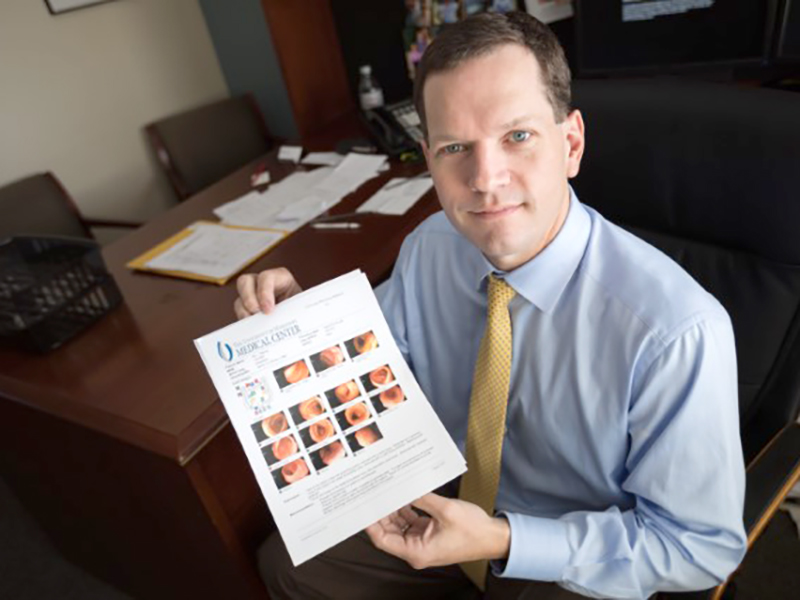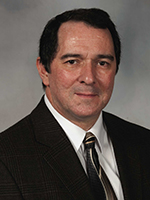Too often, excuses outweigh commitment to colorectal cancer screenings
Seeing someone who delayed screening until they have colorectal cancer is the “saddest thing in the world,” said Dr. James Sones, who has spent decades performing colonoscopies.
Dr. Shannon Orr’s job at the University of Mississippi Medical Center gives him a vivid view of what happens to many people when they avoid or delay colorectal cancer screening. The oncologic surgeon’s heart gave him another reason to schedule his screening early.
Orr’s parents both had colorectal cancer, giving him and his siblings a higher chance of having it, too. So to celebrate his 40th birthday, Orr scheduled a colonoscopy with Sones, UMMC professor and chair of digestive diseases.

“Colorectal cancer is mostly a preventable cancer if you catch it early by screening,” said Orr, a UMMC assistant professor of surgery. “I also thought that being the lead on the gastrointestinal team, I could set an example by getting it done.”
Orr leads the UMMC Cancer Institute’s Interdisciplinary Gastrointestinal Cancer Program, the members of which meet weekly to review and discuss the best treatment for each new patient with a GI cancer.
“As head of the team, I would encourage people to be screened,” Orr said. “It would be nice if I didn’t have a job taking out colorectal cancers.”
The most commonly used screening options are colonoscopy and stool tests. During a colonoscopy, doctors can remove any polyps or suspicious tissues they find. If a stool test or a stool/DNA test reveals blood or markers, doctors may recommend a colonoscopy.

Sones shares Orr’s wish but fears excuses overcome need for too many people.
Sones estimates he finds polyps, or small, wart-like protrusions, in 20-30 percent of his patients.
“You’ll find 10 or 15 in one patient and go five or six patients without finding any,” he said.
Removing polyps can prevent colon cancer. If left undetected, they can become malignant.
Sones endorses the 70x2020 Colorectal Cancer Screening Initiative that seeks to see at least 70 percent of eligible Mississippians screened by 2020. No excuse is strong enough to delay a screening that could prevent cancer, he said.
“That’s the saddest thing in the world to see someone who delayed being screened and they come in because they have blood in their stool and you find out they have colon cancer,” he said. “This is the only cancer you can prevent by taking a day out of your life and having a test every few years.
“Other cancers are discovered when they’re advanced. You can find this one before you have symptoms.”
Sones said he’s heard all the colonoscopy excuses: ‘I’m scared it will hurt,” “The preparation is too difficult” or “I’m just too busy.” He counters each: Doctors make sure the procedure doesn’t hurt, the prep is easier now and no amount of time lost for the test is worth getting colon cancer.
As the 70x2020 Initiative enters its fourth year, Dr. Roy Duhe, UMMC professor of pharmacology and toxicology who helped start the statewide effort, said Mississippi is making some progress, but not fast enough.
When the initiative started in 2014, the Behavioral Risk Factor Surveillance System’s 2012 survey showed 58.8 percent of Mississippians reported being screened in the previous year with a fecal occult blood test, or in the previous 10 years with a sigmoidoscopy or colonoscopy. In 2016, those BRFSS numbers were up to 63.8 percent.
That’s far short of the 70 percent goal the more than 650 members of the 70x2020 Initiative hope to achieve, said Duhe, a member of the UMMC Cancer Institute’s Population Science Research Program.

Screening can save lives, Duhe said. The Centers for Disease Control estimates screening could prevent up to 60 percent of deaths from colorectal cancer. In Mississippi, adequate screening could save hundreds of lives: The Mississippi Cancer Registry shows that in 2015, 1,713 Mississippi residents were diagnosed with colorectal cancer and 610 died of it.
Members of the 70x2020 Initiative are working to raise awareness of the need to be screened and to encourage employers to increase screening for employees who have good health coverage.
“Not everyone can afford a colonoscopy,” Duhe said. “We want them to be aware they have other screening options that will help detect early forms of cancer.”
Duhe said 70x2020 members also ask Mississippians who are younger than 50 or who have already been screened to encourage a loved one who is 50 or older to be screened.
To schedule a colonoscopy with a UMMC physician, call (601) 984-4540, then press 2 for a lab appointment.
Colorectal cancer screening is recommended for everyone ages 50-75. Several variables may mean an individual should be screened earlier. Each person should talk to his doctor about the right time to begin screening.
Those variables include:
• People who have a first-degree relative with colorectal cancer should begin screening at age 40 or 10 years younger than the relative was diagnosed;
• African-Americans, a group that has been found to have particularly aggressive colon cancers, should begin screening at age 45 or earlier if they have relatives who have had this cancer; and
• People with certain genetic syndromes or inflammatory bowel diseases should begin screening earlier.



